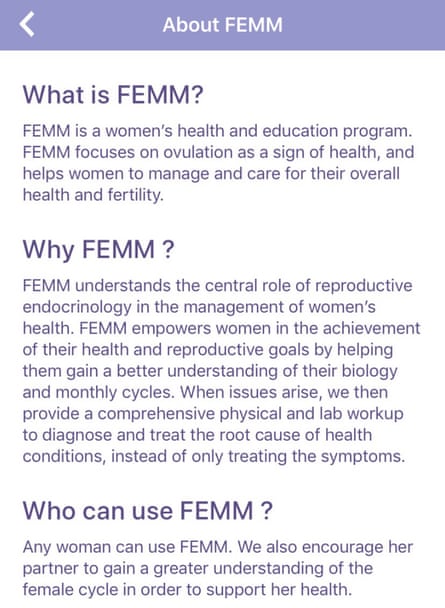US federal grants intended to help poor women obtain contraceptives are being used to promote a menstruation tracking app funded and operated by anti-birth control and anti-abortion campaigners.
The Femm app sows doubt about the birth control pill and promotes itself as a natural way for women to “avoid or achieve” pregnancy. The app collects women’s most intimate data, including details on menstruation, sex, mood and prescription drugs. Its developers say it has been downloaded more than 400,000 times.
The app is led by the nonprofit Femm Foundation, whose board opposes abortion, and whose leaders have repeatedly refused to answer questions from the Guardian on how effective the method is as a contraceptive. One of the foundation’s leading board members, Sean Fieler, is a prominent Republican political donor and a vocal supporter of Trump’s anti-abortion policies.
A grant proposal by Obria Group, a network of “crisis pregnancy centers” based in California, show the centers asked for $5.9m per year. It was later awarded $1.7m per year in funding approved by the Trump administration, and has the potential to receive $5.1m over three years.
The Femm Foundation’s methods and app are being used as key components of Obria’s natural family planning program promoting “the value of abstinence”.
Femm was a prominent part of the Obria Group’s proposal for Title X funds. The Obria Group said in its application it wanted to use the Femm app and educational material at 21 clinic locations in Los Angeles, Orange, San Diego and Santa Clara counties.
The Title X program was designed to provide poor women with “effective medically … approved contraceptive services”. Obria Group originally requested $5.9m per year to serve 12,000 patients across four counties in California.

Federal grants for family planning, part of the Title X program, are meant to be awarded, “to offer a broad range of acceptable and effective medically [FDA] approved contraceptive methods and related services”, according to the Department of Health and Human Services.
“Given the lack of evidence about its effectiveness and concerns about messages discouraging other family planning methods, the Femm app and program do not appear to be in line with a public health approach or goals,” said Andrea Swartzendruber, a public health researcher at the University of Georgia.
Neither Obria nor Femm responded to repeated questions about how effective Femm’s methods are at preventing pregnancy. In general, natural family planning methods have a failure rate of up to 33 pregnancies per 100 women per year, according to the most recent available evidence published in Obstetrics & Gynecology.
Unlike other fertility awareness-based methods, for example the Natural Cycles app, Femm is not approved by the US Food and Drug Administration contraceptive. It appears to be the first ideologically aligned menstruation tracking app.
“Funding for centers that aren’t striving to offer a comprehensive family planning services stands in contrast with the foundational principles that have guided the Title X program for the past 50 years,” said Swartzendruber.
The Femm Foundation operates the Femm app. Its CEO, Anna Halpine, said Femm “does not have a contract with Obria and has never received funding from them”.
However, Obria’s proposal to certify 40 teachers and 15 nurses in Femm natural family planning methods is unlikely to need a contract, since the certification is a publicly available nine-week online (or two-day in-person) course. Each certification costs $650. Obria also proposed hiring a full-time health education manager to ensure, “implementation of Femm fertility awareness”, among other duties.
In the Obria Group’s application for the grant program, it names Femm as part of its “birth control education sessions”. Clients who come to Obria and “are interested in including [fertility awareness-based methods] of family planning” are to be offered education through Femm, “offered onsite or via telehealth at all Obria affiliate project clinics”.
The Obria Group goes on to describe the Femm Foundations’s “research arm”, the Reproductive Health Research Institute (RHRI). In fact, RHRI is operated by an anti-abortion doctor based in Santiago, Chile, whose primarily affiliation is with a Catholic university. The doctor is not licensed to practice in the United States.
Femm is also listed in Obria’s application as part of their “basic infertility services”. There is no published data about the efficacy of Femm as an infertility treatment.
Femm is closely affiliated with the World Youth Alliance, an anti-abortion nonprofit which often lobbies against reproductive rights at the United Nations. World Youth Alliance and Femm share an office in Manhattan. They also share funders. One of Femm’s former board members, Ellen Roy, is also a border member of the Obria Group.
“Femm’s program is based upon a particular religious ideology that forbids birth control and instead promotes fertility awareness, one of the least effective methods for avoiding pregnancy,” said Alice Huling, counsel for the left-leaning watchdog group Campaign for Accountability, which pushes for greater access to reproductive health services.
When approached for comment, Obria referred the Guardian to the Republican crisis communications firm CRC Public Relations.
CRC did not respond to questions about whether the efforts had changed because of the smaller award, but said: “Femm is a comprehensive women’s health program committed to expanding information, research, and knowledge about women’s reproductive health. It is an easy way for women to understand their fertility, and their overall health.”
The Femm Foundation CEO Halpine said: “Femm is pleased to support Federally Qualified Health Centers that provide science and evidence-based health education to economically disadvantaged and under-served populations. Femm thinks that every woman deserves to be educated and empowered about her body and cycle.”
